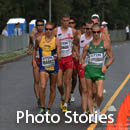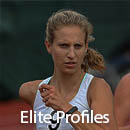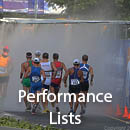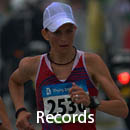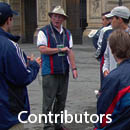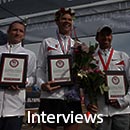JOANNE DOW
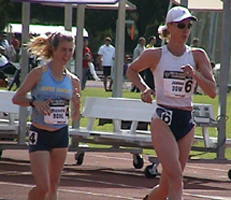
Birthday: March 19th, 1964
Current Residence: Manchester, NH
Hometown: Manchester, NH
College: University of New Hampshire
PRS
Outdoors
10 km - 45:36.92
20 km - 1:32:55
In 1994, while teaching a fitness-walking class, Joanne Dow met some members of the New England Walkers Club and became interested in race walking. Not long after, she attended a clinic presented by Martin Rudow, former Men's National Race Walking Team Coach. Rudow announced to the participants that those who walked fast but had horrible technique would get the most out of the class. Dow identified with this description completely.
During the clinic, Rudow told Dow she had the potential to race with the best women in the sport if she decided to train. That weekend she walked a relatively mediocre 10K (54+ minutes); in a very short time Dow would enter the World Cup trials and finish seventh.
Vastly improved and just two places from making the team to compete at Beijing, Dow wasn't disappointed. She had created a stir, and word spread about this newcomer to the race walking scene. She took the comments in the best possible light and felt more motivated than ever.
Dow next walked a sub-48 minute 10K at the National Invitational in Washington, DC. Finally comprehending her potential in the sport, she realized she needed a coach and fortunately found Mark Fenton. Sadly, her timing couldn't have been worse. Like many newbie race walkers, Dow had become great very quickly, but at a cost: she tore her hamstring, an injury requiring a lengthy recovery. After nearly a year—and without a good training base—Dow entered the 1996 Olympic Trials. Her tenth-place finish and berth to the U.S. Women's National Team could be considered a great success.
The following two years proved very fruitful as the combination of Fenton’s guidance and Dow's hard work paid off. She achieved personal records, walking the 10K in 45:36 and the 20K in 1:33:27. Though proud of the times she walked, Dow feels even prouder of her ability to pull things together under pressure. Representing the U.S. at the Pan Am Cup in Miami, she was concerned about finishing the 20K distance in the heat. She believed the international contestants would be more adapted to the hot and humid conditions. When the field went out conservatively, Dow took the lead. As the race progressed she continued widening her gap, never looking back as she achieved her first international gold medal. She continued her winning ways at the Goodwill Games, winning the bronze medal at her first-ever track 10K and beating all the Americans and two Russians in the process.
By the end of 1999, Dow had raced many a good race. Too many, in fact. She had competed in five 20Ks in a span of six months. By the end, she was tired and her technique reflected it. At the World Championships the unimaginable happened: she DQ'd 6K into the race. Upset, she nonetheless learned a valuable lesson: racing a lot does not work! She came to understand the importance of recovering physically, psychologically, and emotionally.
While Dow regrouped for 2000 with the goal of making the Olympic team, an early season knee surgery unfortunately derailed her plans. Recovering from the surgery, she gave it her all but fell just short, finishing 4th. The finish qualified her for further international competition, but she opted out to rest and fully recover from her surgery.
After going through the motions in 2001, Dow came on strong in 2002, winning the U.S. 20K Nationals and competing on the World Cup Team. Unfortunately, difficulties in meeting with her coach forced her to look for a new one. She turned to her alma mater, the University of New Hampshire. She found a new coach and new outlook, just what she needed. At the time this book is going to press, she is the only American woman with the A standard required to qualify for the 2004 Olympic Games.
Dow says, “Race walking is just a piece of my life.” Her priority is “being a wife and mom.” Married to Tim Dow, she has two children: Hannah, born 1989, and Timmy, born 1992.
2003
2nd - 1:34:57.8
2002
1st - 1:34:47
2001
5th - 1:38:52
2000
4th - 1:36:17
1999
2nd - 1:33:27
1998
1st - 47:37
1997
4th - 47:20
1996
10th - 47:54
2003
3000M - 13:07.68
2002
3000M - 13:05.72
1999
3000M - 12:44.90
2002
20K - 1:34:46.62
2001
1 Hour - 12,891m
1998
10K - 47:06.50
20K - 1:34:46
20K World Championships
2003 - 24 th - 1:36.?? - Paris, France
1999 - DQ – Seville, Spain
20K World Cup
2002 - 50 th - 1:41.00 - Torino, Italy
1999 - 53 rd - 1:38:08 - Mezidon, France
10K World Cup
1997 – 61 st - 47:23 - Podebrady, Czechoslovakia
20K Pan Am Games
2003 - 3 rd - 1:35.47 - Santo Domingo, Dominican Republic
1999 - 5 th - 1:36:35 – Winnipeg, Canada
20K Pan Am Cup
1998 - 1 st - 1:38:57 - Miami, USA
Goodwill Games
1998 - 3 rd – 45:36.92 - Moscow, Soviet Union
